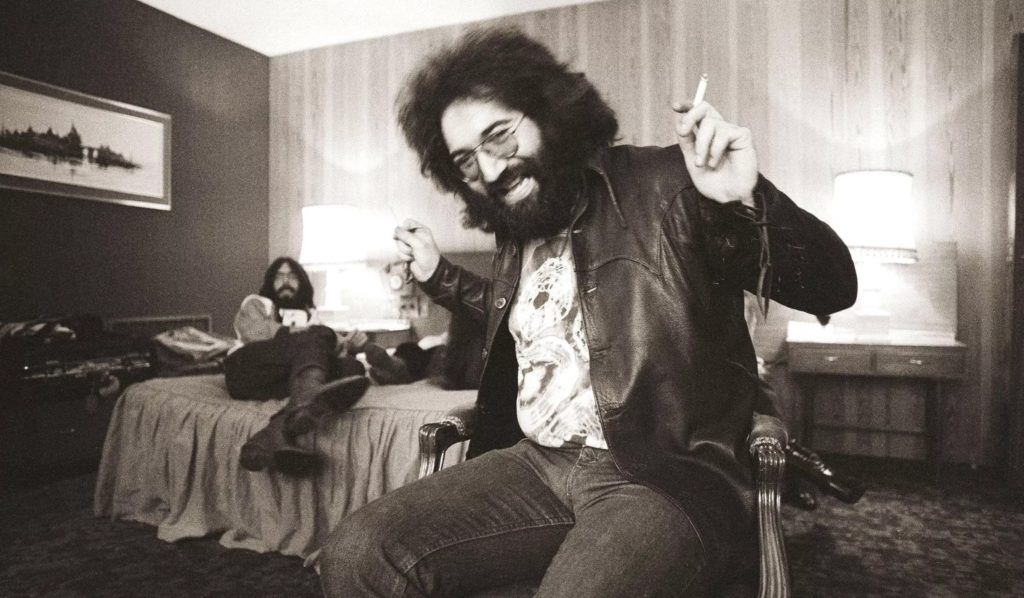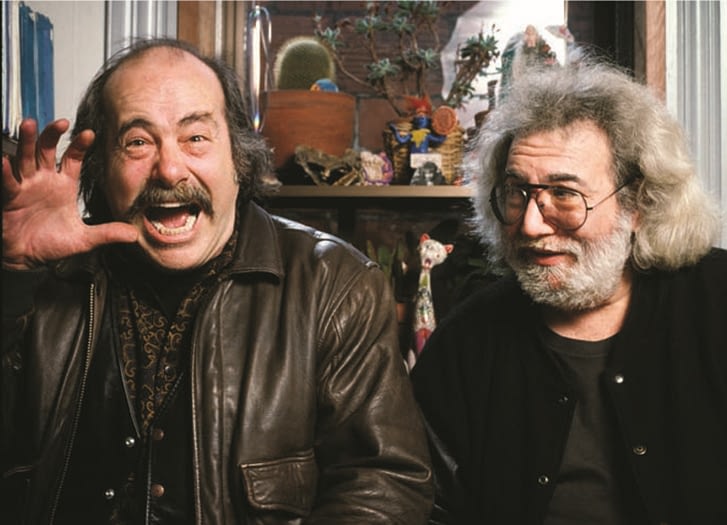The Meaning of the Grateful Dead’s “Sugaree”

“Sugaree” is one of those Grateful Dead songs that anybody can enjoy, regardless of whether or not they’re a deadhead. The bouncy, palatable single was included on Jerry Garcia’s 1972 album, Garcia, and it first entered the Grateful Dead live rotation on July 31st, 1971 at the Yale Bowl at Yale University. From then on it was a staple in their live show right up until the very end, plus in Jerry Garcia’s solo projects. It still remains a favorite among fans today.
The song is a classic Garcia/Hunter collaboration, one of many with Robert Hunter penning the lyrics and Jerry Garcia providing the musical composition. The pair created a whole lot of great songs together that way, and “Sugaree” is certainly one of them. It has a playful energy, thanks to Garcia’s singing, yet the lyrics are somewhat ambiguous in their meaning, leading to speculation amongst deadheads over the years.
Perhaps the beauty of the Grateful Dead and Robert Hunter’s songwriting particularly is that many aspects of them are open to a variety of interpretations. This allows fans to relate with the music in their own way, and get creative with it thanks to the band’s encouragement toward improvisation and thinking outside the box.
However, Robert Hunter himself revealed the meaning of “Sugaree” in the liner notes for the All Good Things box set released in 2004, as seen on Dead.net:
Sugaree was written soon after I moved from the Garcia household to China Camp. People assume the idea was cadged from Elizabeth Cotten’s ‘Sugaree,’ but, in fact, the song was originally titled ‘Stingaree,’ which is a poisonous South Sea manta. The phrase ‘just don’t tell them that you know me’ was prompted by something said by an associate in my pre-Dead days when my destitute circumstances found me fraternizing with a gang of minor criminals. What he said, when departing, was: ‘Hold your mud and don’t mention my name.’
Why change the title to ‘Sugaree’? Just thought it sounded better that way, made the addressee seem more hard-bitten to bear a sugar-coated name. The song, as I imagined it, is addressed to a pimp. And yes, I knew Libba’s song, and did indeed borrow the new name from her, suggested by the ‘Shake it’ refrain.
Robert Hunter’s liner notes for “Sugaree”

The renowned North Carolina folk singer Elizabeth “Libba” Cotten wrote and recorded “Shake Sugaree” in 1966, as part of an album that she made with her granddaughters. Hunter heard this and popped the name “Sugaree” right into his song, which went on to become one of the most beloved Grateful Dead songs.
With all of this in mind, let’s take a look at the story being told by the lyrics, starting with the first verse:
When they come to take you down
First verse to “Sugaree” by the Grateful Dead.
When they bring that wagon ’round
When they come to call on you
And drag your poor body down
Garcia addresses someone who is in trouble with the law, and they are coming down with the paddy wagon to drag his “poor body down” to the local jail.
In the pre-chorus, we get some insight as to the relationship between these two people:
Just one thing I ask of you, is just one thing for me
Pre-chorus to “Sugaree” by the Grateful Dead.
Please forget you know my name, my darling Sugaree
This is person is a friend or lover, and is perhaps involved in the same types of crimes, and thus requests that when the police do come around, they don’t mention their relationship. Otherwise, they might both end up in trouble with the law.
The chorus shows that Garcia is rooting for his friend, but still doesn’t want to be involved:
Shake it, shake it, Sugaree
Chorus to “Sugaree” by the Grateful Dead.
Just don’t tell them that you know me
Shake it, shake it, Sugaree
Just don’t tell them that you know me
When he sings “shake it”, he is referring to shaking the charges. However, this should be done in a way that does not involve ratting out your friends.

In the second verse, we can see that our criminal friend may have been quite brazen in his acts:
You thought you was the cool fool
Second verse to “Sugaree” by the Grateful Dead.
And never could do no wrong
You had everything sewed up tight
How come you lay awake all night long?
Here, Garcia sings about how their friend may have considered themselves a smooth criminal, with all of their crimes planned out perfectly so that there was no chance of being caught. Still, they lay awake all night and worry, which leads our narrator to believe that this person must be on the authorities’ radar.
After this, we bounce back into the pre-chorus and chorus before Garcia sings the third and final verse:
Well, in spite of all you gained
Third verse to “Sugaree” by the Grateful Dead.
You still had to stand out in the pouring rain
One last voice is calling you
And I guess it’s time you go
With the third verse, Hunter’s lyrics suggest that a life of crime is not worth it in the end, because no matter how much you gain during moments of victory, the rain of the law is still likely to fall upon you sometime.
There may be a chance here, though, as our narrator implies by telling their friend it’s time to go. It’s time to hit the road and run from the law, lest he spend many years behind bars. But, no matter what happens, they are to never tell about their relationship.
This is made clear with plenty of guitar soloing and another hit of the chorus before Jerry sings the bridge:
Well shake it up now, Sugaree
Bridge to “Sugaree” by the Grateful Dead.
I’ll meet you at the Jubilee
If that Jubilee don’t come
Maybe I’ll meet you on the run
The bridge offers a farewell to this friend, with Garcia telling them that they will meet again when they are released from prison, or when the charges are dropped and they get off scot-free. The use of “Jubilee” is a reference to the Old Testament — a time when slaves and prisoners are freed, and debts are forgiven.
If they never have the moment of Jubilee, Garcia posits that they may meet somewhere down the line, when one or the other is on the run from the law.
The song closes out with a drawn-out chorus, for as long as the band may please.
Watch the Grateful Dead performing “Sugaree” live at Winterland in 1974, during their final run of shows before their hiatus in 1975.